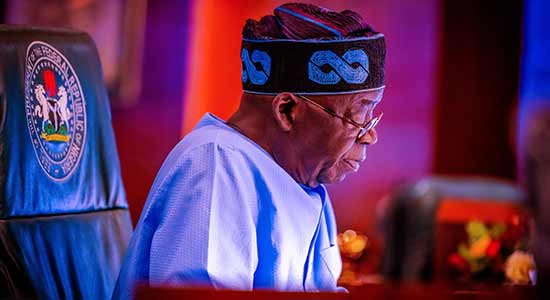In a commendable act, President Bola Ahmed Tinubu has shown that the voice of the people holds weight in the corridors of power. By promptly halting the implementation of the controversial cyber security levy, he has not only acknowledged the concerns of his citizens but has also acted to allay their fears.
This act of responsiveness should be the norm, not the exception, in Nigerian governance and has set a precedent that should extend to other pressing issues, most notably, the ongoing discussions about setting the minimum wage increase. And so the focus must now turn to the issue of the minimum wage. The government must act swiftly and decisively to implement a minimum wage that is fair, just and reflective of the economic challenges faced by average Nigerians.
With the current economic hardship and volatility of prices, the current minimum wage of N30,000 basically sentences millions of hard-working Nigerians to unspeakable poverty and strips them of the basic necessities of life, making it difficult for many to maintain a decent standard of living.
The Nigeria Labour Congress (NLC) and the Trade Union Congress (TUC) have urged President Tinubu’s administration to accelerate the wage review. The Minister of State for Labour and Employment, Nkeiruka Onyejeocha, acknowledged the delay in finalising the new wage but emphasised that consultations are underway to expedite the process, with the NLC and TUC insisting that the negotiations must come to an end on May 31, 2024.
- Emirship tussle: Kano Dep Gov retracts allegation against Ribadu
- Nigeria to review capitation fees for health insurance contributors – NHIA
While organised labour has recently demanded a minimum wage of N615,000 to address economic challenges and the high cost of living in Nigeria, the government has put forward a counter offer of N48,000, which, unsurprisingly, was rejected by the NLC and TUC.
Personally, I will propose that the new minimum wage be determined using the new global poverty line of 2.15 US dollars per day. Therefore, using the current dollar rate of N1500 to a US dollar, N96,750 should be the minimum and realistic amount the government should offer.
By instituting a minimum wage that is just and equitable, President Tinubu can reinforce his image as a leader who is not only a listener but also a champion for the rights of his citizens. Such a move would offer much-needed relief to countless Nigerian families and build a foundation of trust and confidence in the government.
Let me be clear: Raising the minimum wage will not be easy. The more common opponents will criticise any increase. Economists will argue that it will raise inflation, business associations will predict a “disastrous” rise in unemployment, and fiscal conservatives will advise against and warn about budget constraints, all because these are the refrains that play anywhere that someone attempts to enact policies that benefit the working class.
Repeated studies, however, have demonstrated that higher minimum wages actually stimulate economic growth as workers now have more disposable income to spend in their local communities. When it comes to job loss, major American cities like Washington, Seattle and New York – their lockdown-induced recession notwithstanding – have raised their minimum wages to over $15 per hour with little to no impact on employment.
Ultimately, however, the far greater cost is continuing to maintain the status quo, where an abundance of people work tirelessly, live from paycheck to paycheck, and still are unable to make ends meet. How can one hope to see Nigeria’s economy grow in a meaningful way if almost all of its population cannot actually afford to buy anything?
With the raising of the minimum wage being one of the most vital goals that the Tinubu administration must strive for, additional investment must be made in education, healthcare and infrastructure to rapidly build the country’s human capital.
Simultaneously, the widespread non-compliance with the current minimum wage laws already on the books must be aggressively prosecuted and finalised. All too frequently, predatory entrepreneurs have been permitted to pay “slave wages” of just N10,000 to N15,000 a month, just because “sweatshop”-type labour law infractions go unpunished.
Critics will also say that the country cannot afford higher labour costs in a period of harsh economics and rampant inflation. However, this argument is insufficient, as trickle-down economics is a complete failure in Nigeria. Decades of abundant accumulation of wealth at the top of the pyramid, the neglect of the poor, and the wage gap have brought nothing but miserable economic growth, social disharmony, and a poorly developed domestic consumer market.
Raising the minimum wage is not a silver bullet. But, when coupled with investments in economic diversification, curbing corruption and human capital development, it can pave the way to a prosperous middle class and more equitable, balanced growth. Like it or not, no economy can prosper when the vast majority of the citizens lack the purchasing power to take part as consumers.
President Tinubu’s administration, therefore, stands on the cusp of falling on the right side of history, for it has a golden opportunity to do what previous administrations failed to achieve over the years and formulate a decent living minimum wage in Nigeria.
Cementing a commitment to worker rights and bringing an end to the minimum wage soap opera in this nation would be a monumental victory and legacy for this administration. He will also leave behind him an indisputable heritage of a determined commitment to eradicating poverty among the majority of Nigerians. Workers in Nigeria deserve more; it is not the hour for pledges but for the government to take a decisive stand.
Dr Halimah Sanda wrote from Abuja

 Join Daily Trust WhatsApp Community For Quick Access To News and Happenings Around You.
Join Daily Trust WhatsApp Community For Quick Access To News and Happenings Around You.


